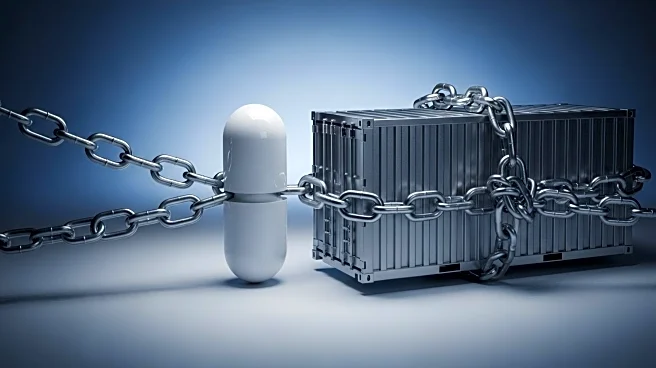What's Happening?
The Trump administration has announced a new tariff package targeting imported heavy trucks and branded pharmaceuticals, set to take effect on October 1, 2025. The tariffs include a 25% levy on heavy-duty trucks and a 100% tariff on branded and patented drugs. These measures aim to bolster U.S. manufacturers like Peterbilt, Kenworth, and Freightliner by reducing foreign competition. Mexico, a significant exporter of medium- and heavy-duty trucks to the U.S., is particularly affected, as its exports have tripled since 2019. The pharmaceutical industry, especially European firms exporting to the U.S., faces challenges in adapting to these new cost structures. Companies may need to absorb costs, shift production closer to the U.S., or stockpile products. The logistics sector could see increased warehousing and expedited shipments in the short term, with potential long-term investments in U.S.-based production facilities.
Why It's Important?
These tariffs represent a significant shift in U.S. trade policy, with potential implications for domestic manufacturing and global supply chains. For the trucking industry, the tariffs could strengthen U.S. manufacturers and encourage investment in domestic production, potentially safeguarding national security interests. However, fleets may face higher acquisition costs for vehicles and parts. In the pharmaceutical sector, the tariffs could disrupt global supply chains, forcing companies to reconsider their production and distribution strategies. This could lead to increased costs for essential medicines and impact the availability of drugs in the U.S. market. The broader significance lies in the potential for these tariffs to reshape industry dynamics, influencing trade relationships and economic strategies.
What's Next?
As the tariffs take effect, stakeholders in the trucking and pharmaceutical industries will need to navigate the new landscape. Truck manufacturers may ramp up domestic production to mitigate the impact of reduced imports, while pharmaceutical companies might explore alternative sourcing and production strategies. Logistics providers will play a crucial role in managing the transition, balancing short-term disruptions with long-term strategic shifts. The response from affected countries, particularly Mexico and European nations, could influence future trade negotiations and policies. Industry leaders will need to assess the risks and opportunities presented by these tariffs, adapting their operations to maintain competitiveness and ensure supply chain resilience.
Beyond the Headlines
The imposition of these tariffs raises questions about the ethical and geopolitical dimensions of trade policy. The pharmaceutical tariffs, in particular, could affect the availability and affordability of essential medicines, posing challenges for public health. The interconnected nature of global supply chains means that changes in U.S. policy can have far-reaching effects, potentially altering international trade dynamics and economic relationships. The long-term impact on innovation and investment in affected industries remains uncertain, as companies weigh the benefits of domestic production against the complexities of global integration.









